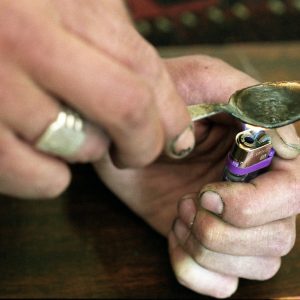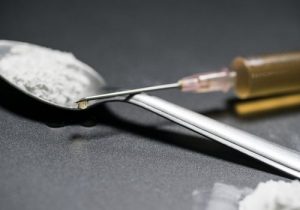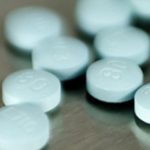Unlike other opioids used for medication under a prescription, heroin is an illicit opioid that is highly addictive and dangerous. If you are caught using or selling it on the streets, then you will receive a corresponding legal penalty from both federal and state laws.
In this read, we are going to tackle the legal and health consequences of possessing and abusing heroin. Read further to learn more about it.
What is its Physical Appearance?
In the Eastern side of the United States, heroin is sold in white to off-white powder. The higher its purity, the whiter it is. Meanwhile, on the western side, you will see black or dark brown heroin powder, which is more commonly known as “black tar”.
How Do You Use Heroin?
 Abusers use this illicit opioid in three main ways – smoking, snorting, or injecting into your veins or under your skin. The people believed that snorting and smoking heroin will be less addictive than injection. However, when the person develops a tolerance, he will eventually go for injecting this drug into his veins to achieve a faster result.
Abusers use this illicit opioid in three main ways – smoking, snorting, or injecting into your veins or under your skin. The people believed that snorting and smoking heroin will be less addictive than injection. However, when the person develops a tolerance, he will eventually go for injecting this drug into his veins to achieve a faster result.
In the U.S., around 3.09 million people (ages 12 and older) are using this drug for recreational purposes. Based on this user population, we can break down the abusers into two age groups and their respective populations.
- Age 12-17. 76,000 abusers
- Age 18-25. 4474,000 abusers
How Rampant is Heroin Abuse in the United States?
In 2016, a survey was conducted and it showed that around 948,000 Americans used heroin in the previous year. So far, there is an increasing trend in heroin consumption from 2007 to 2016, and it’s mostly users within the age bracket of 18 to 25 years.
Furthermore, here are some data showing the number of heroin abusers in the United States from 2002-2016.
- Around 170,000 abusers starting from 2016
- In 2006, there are around 90,000 users
- At the end of 2016, the total number of heroin abusers total to 626,000
- Fortunately, there is a decreasing rate of heroin users among the 8th, 10th, and 12th-grade students.
What Are The Legal Penalties for Possessing Heroin?
There are corresponding federal and state law penalties when you are caught possessing this illegal substance. Below are some specific details for the legal consequences of possessing heroin.
Federal Offense Against Heroin
- A first offense under the federal court of possessing this illicit drug entails a punishment of one-year imprisonment (maximum) or a minimum fine of $1,000, or both.
- A second offense under a federal or state court entails a punishment of 15 days to two years of imprisonment or a minimum fine of $2,500, or both.
- For the succeeding arrests, the person will render 90 days imprisonment or a minimum fine of $5,000, or both.
State Offense Against Heroin
- The possession of this illicit opioid is subject to state laws and the respective penalties will depend on which state is the person sentenced to.
How the Prosecutor Proves Heroin Possession?
 For you to get punished accordingly, the prosecutor must prove either in a federal or state court that you are possessing this illicit drug. Below are two means where the prosecutor can secure a conviction for a person holding and selling this substance.
For you to get punished accordingly, the prosecutor must prove either in a federal or state court that you are possessing this illicit drug. Below are two means where the prosecutor can secure a conviction for a person holding and selling this substance.
Knowing Possession
The prosecutor must secure evidence that the individual is fully aware of having the illicit opioid in his personal belongings.
Actual and Constructive Possession
When a person possesses the drug in real-time, then that is actual possession. Whereas, constructive possession happens when an individual can manipulate the flow of the item containing the drug.
What is the Typical Defense When Caught Possessing Heroin?
When an officer catches you in actual or constructive possession of this illicit opioid, you still have two means of proving your innocence. Check out these two reasons below.
Unknowing of the Drug’s Presence
If the person can sincerely prove to the jury that he gained possession of the bag accidentally containing the drug, then he can be set free without legal charges.
Proving that You Have No Control of Possessing the Drug
When you are accused of controlling the possession of the bag containing the drug, then you need to prove to the jury that you cannot do it based on your current work or position.
Under What Drug Schedule is Heroin?
This illicit opioid is under Schedule 1 controlled substances under the Drug Enforcement Administration (DEA) classification. With that, it means heroin is a highly addictive substance with great potential for abuse. Also, there are no approved medical applications and benefits from using this illegal substance.
What are the Street Names of Heroin?
Besides its name “heroin”, sellers of this illicit drug use codes or street names to hide the true identity of this substance. Below are some of the usual street names used to denote heroin.
- Capital H
- Chiva
- Boy
- Big H
- China white
- Dead on arrival
- Diesel
- Good H
- Hell dust
- Horse
- Poppy
- Thunder
- White junk
- Train
- Dope
- Mud
- Smack
- H
What Moves Individuals to Abuse Heroin?
Substance use disorder and alcoholism are some of the rampant problems in the United States, and it’s drastically destroying many lives. In line with this, heroin is one of the most abused opioid substances due to the high feeling it gives to the user.
Furthermore, here are some culprits why an individual abuse this illicit drug.
 For recreational purposes
For recreational purposes- To escape the sad reality and life-problems
- The person already has a history of drug abuse or alcoholism
- Peer pressure
- Self-medication
- For experimental reasons
Seek Medical Help to Overcome Heroin Addiction
When you find yourself or your loved one suffering from heroin addiction, you must find a way to increase their awareness and accept the reality that they need medical help. Alongside this, you can look for a trusted addiction specialist near you, so you can seek advice and a customized treatment program to recover from heroin addiction.
For severe heroin overdose, we recommend that you undergo an inpatient recovery program, so you have 24-hour medical supervision in your treatment. Once you show progress, then you can request to shift to an outpatient treatment plan.
Talk to a doctor or addiction specialist today.













